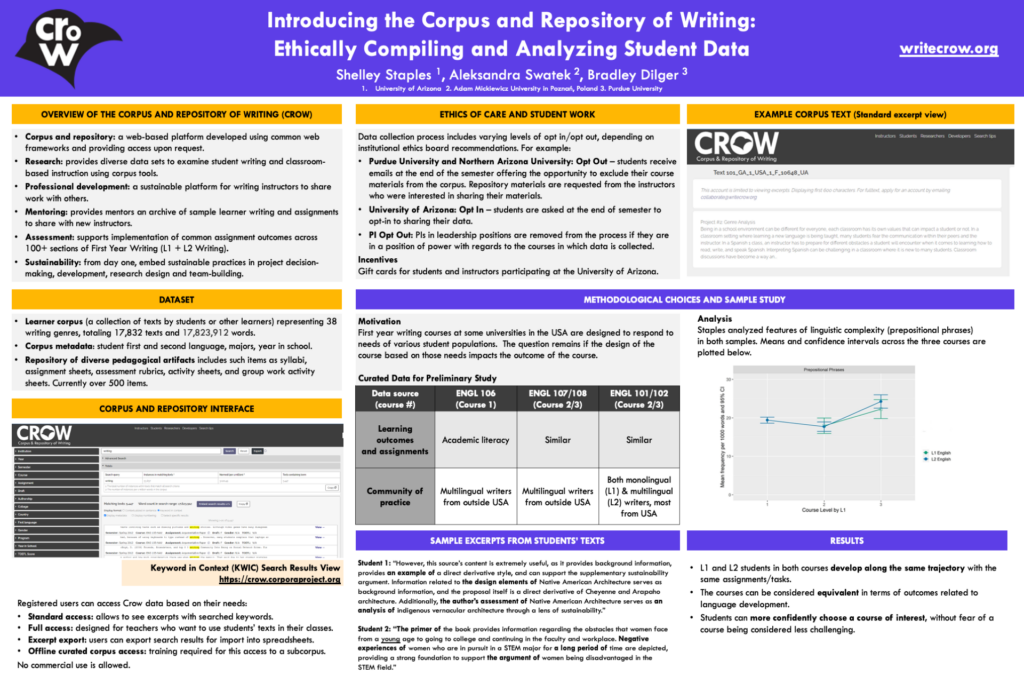We’re very glad to be participating in the Association for Computers in the Humanities virtual conference (ACH 2023). Shelley Staples, Ola Swatek, and Bradley Dilger have two online events. Links below are available to those who have registered for the conference. Both of those times are EDT (UTC–4); links allow adjusting for your time zone.
Roundtable: Fri June 30, 2:30p
First, we’re part of a roundtable organized by Heather Froehlich, “Ethics of digital stewardship in digital projects: a roundtable:” Friday, June 20, from 2:30p to 3:45p.
In this roundtable, practitioners from a variety of digital projects will discuss how the ethics of stewardship are foregrounded in our practices. Digital projects regularly rely on student labour, and the Student Collaborator’s Bill of Rights (2015) remains a highly-cited and highly-used vehicle for making our student workers feel like a valued part of a project team. However, the ethics of care extends beyond our student workers and collaborators into how we might need to regularly re-conceptualize our projects that engage with content created by a specific audience for a specific purpose. For example, working with content produced by and for students protected by FERPA in the USA introduces a first level of concern. This becomes more complex when our projects increasingly include content created outside a US environment and/or with a focus on the lived experiences of real people. The following projects will be represented, which cover a range of time periods and geographic circumstances:
- Colored Conventions Project (CCP)
- Corpus & Repository of Writing (CROW)
- Saving Ukrainian Cultural Heritage Online (SUCHO)
Speakers on the roundtable from each project will get 10 minutes to describe their projects and outline responses to the following prompts: What are some ways project leaders can be responsive to their needs? What do digital projects owe participants who are agreeing to be involved? The moderator will pose a few questions before opening the floor to discussion from the audience.
We do not have formal talks planned. Here are our roundtable notes. We plan to audio-record our presentation and will add a transcript afterward.
Poster: Sat June 31, 1:00p
Second, we’ll be sharing “Introducing the Corpus and Repository of Writing: Ethically Compiling and Analyzing Student Data” in the poster session Saturday June 21, from 1:00p to 3:00p.
Projects like the Open Syllabus Explorer illustrate the potential of educational materials as digital humanities objects (Hubbard and Vaaler). Our project turns towards another educational object: undergraduate student writing. This poster introduces the Corpus and Repository of Writing (CROW; Staples and Dilger), illustrating how ethics of care,student work stewardship, and methodological choices are realized in an online corpus of student writing and repository of related pedagogical materials (e.g., syllabi, lesson plans). CROW shows the diversity of student writing in American higher education, with 33 assignment types from three institutions, representing 72 countries and totalling 16,007,868 words.
We developed sustainable practices and tools to ethically collect student writing (including drafts) and author metadata (Kwon et al.). Our project is a model for Open Science in DH, with safeguards against commercial appropriation and issues of academic integrity. In developing this project, we have made key methodological choices, curating data from an opportunistic sample to a structured dataset informed by the contexts in which the material was produced. For example, one research project conducted with CROW data showed that courses with equivalent goals designed to serve different populations are comparable in terms of writing outcomes, allowing us to argue against ideas that certain courses are “remedial” (Staples, under contract).
By illustrating successes in data collection, curation, and analyses, we provide examples of how researchers using other large opportunistic corpora can make similar informed choices in their own research.
Here’s the short video we’ve shared to describe our poster content:
And our poster itself. Download a PDF of the poster.

Should you have any trouble accessing any of the content here, please write to us and we’ll get back to you quickly.
We hope to see you at the conference!